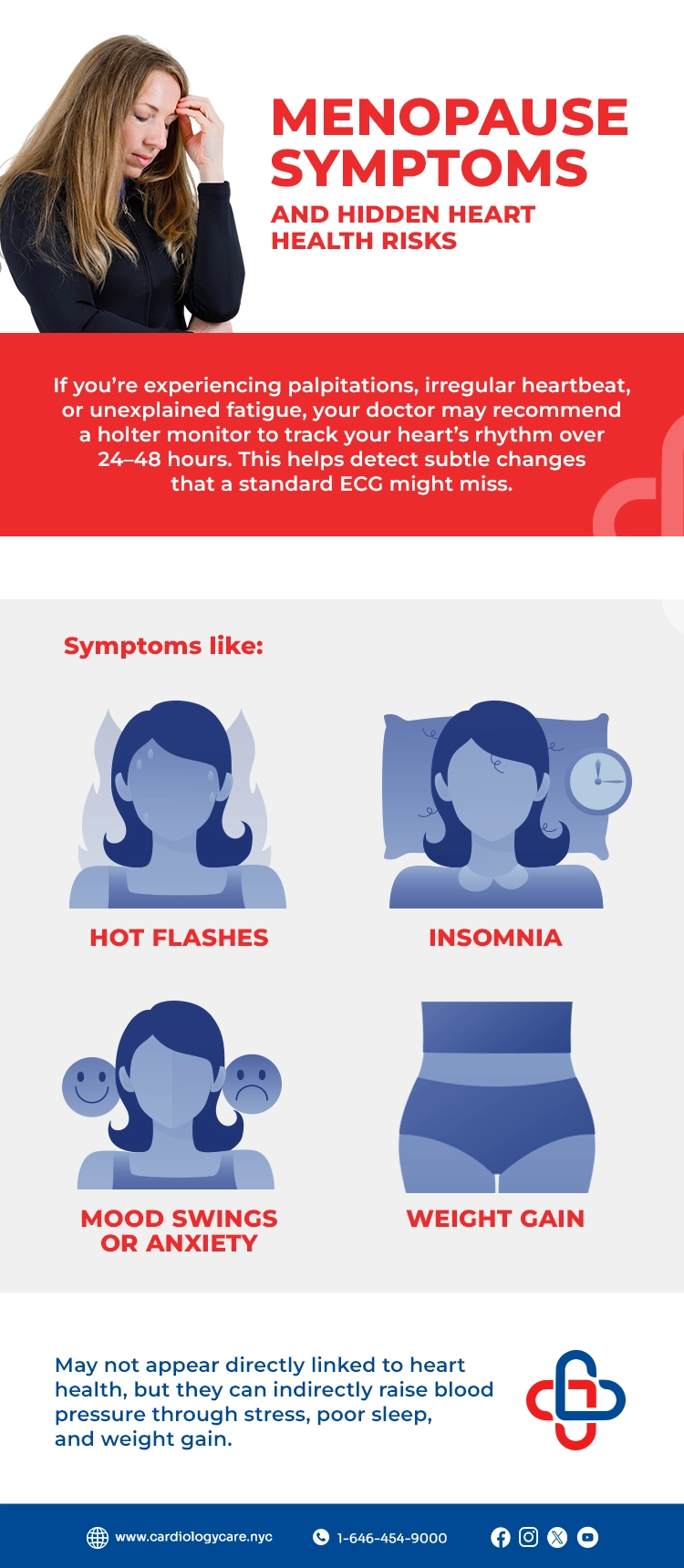You’re living healthy but your blood pressure is rising. Could menopause be to blame? Many women experience this surprising shift during perimenopause or after. Hormonal changes, especially lower estrogen, can impact heart health. Here’s what’s happening and how to stay on top of it.
Table of contents
Can Menopause Cause High Blood Pressure?
Yes, menopause can contribute to elevated blood pressure.
When estrogen levels begin to drop, several things can happen:
- Blood vessels lose elasticity
- The body becomes more sensitive to sodium
- Systolic blood pressure (the top number) tends to rise
These changes mean that even women who previously had normal blood pressure might notice an increase.
Hormones and Heart Health: What’s the Connection?
Estrogen plays a key role in protecting the cardiovascular system by:
- Promoting the dilation of blood vessels
- Regulating cholesterol (increasing HDL and lowering LDL)
- Supporting nitric oxide production to keep arteries flexible
When estrogen levels decline:
- Arteries may become stiffer
- LDL (“bad”) cholesterol can increase
- Blood pressure may rise
- Cardiovascular risk grows
When Do These Changes Begin? Perimenopause and Postmenopausal Risk
Blood pressure can start creeping up during perimenopause, even before your periods stop. Hormone levels fluctuate wildly in this stage, and this volatility may trigger early cardiovascular health changes.
After menopause (12 months without a period), blood pressure often remains elevated—a condition known as postmenopausal hypertension.
Regular blood pressure tests become increasingly important in both stages.
Menopause Symptoms and Hidden Heart Health Risks
If you’re experiencing palpitations, irregular heartbeat, or unexplained fatigue, your doctor may recommend a holter monitor to track your heart’s rhythm over 24–48 hours. This helps detect subtle changes that a standard ECG might miss.
Symptoms like:
- Hot flashes
- Insomnia
- Mood swings or anxiety
- Weight gain
May not appear directly linked to heart health, but they can indirectly raise blood pressure through stress, poor sleep, and weight gain.
How to Monitor and Manage Blood Pressure During Menopause
If your readings remain elevated or you’re unsure about your cardiovascular risk, scheduling a cardiology consultation with a specialist like the team at Cardiology Care NYC can help you better understand your heart health and next steps.
You can’t manage what you don’t measure. During menopause, make blood pressure tracking a regular habit.
- Use a home monitor approved by your doctor
- Check readings at the same time each day
- Track both systolic and diastolic pressure (goal: under 120/80 mmHg if possible)
- Schedule routine check-ups
Tips for Managing Blood Pressure Post-Menopause
For those with symptoms like chest discomfort or shortness of breath during activity, a cardiac stress test can assess how well your heart handles physical exertion. This is especially valuable during or after menopause when cardiovascular risks rise.
Diet:
- Eat potassium-rich foods (leafy greens, bananas, beans)
- Choose whole grains and vegetables
- Limit salt, alcohol, and processed food
Exercise:
- Aim for at least 150 minutes/week of moderate aerobic activity (like brisk walking)
Stress Management:
- Try yoga, deep breathing, or mindfulness meditation
Medications:
- Blood pressure medication may be necessary depending on your risk profile
- Hormone replacement therapy (HRT) may be discussed, but it’s not a primary treatment for high BP
If you’re navigating menopause and noticing changes in your blood pressure, the team at Cardiology Care NYC can help. With expertise in women’s heart health, we provide personalized care to support you through every stage of midlife.
Conclusion
Yes, menopause can raise blood pressure due to lower estrogen and aging arteries. The upside? You can manage it. Know the signs, monitor your numbers, and team up with your doctor to keep your heart strong.
Frequently Asked Questions
Can menopause affect how blood pressure medication works?
Yes, hormonal shifts may influence how your body responds to certain medications, potentially requiring dosage adjustments or alternative treatments.
Is low blood pressure also a concern during menopause?
While high blood pressure is more common, some women may experience episodes of low blood pressure due to vasodilation or hormonal imbalances.
Do hot flashes have any direct impact on blood pressure readings?
Yes, during a hot flash, blood pressure can temporarily spike due to increased heart rate and vascular changes, which may skew home readings.
Can menopause trigger new heart conditions beyond high blood pressure?
It can. Declining estrogen may raise the risk of arrhythmias, coronary artery disease, and even heart failure in predisposed individuals.
Is there a best time of day to check blood pressure during menopause?
Yes, early morning (before caffeine or stress) and evening are ideal times to measure for consistency, especially as menopausal fluctuations may affect readings throughout the day.
Disclaimer
This blog is for informational & educational purposes only and does not intend to substitute any professional medical advice or consultation. For any health-related concerns, please consult with your physician, or call 911.

